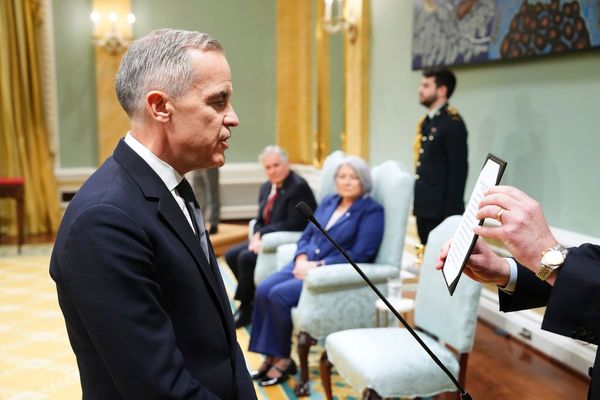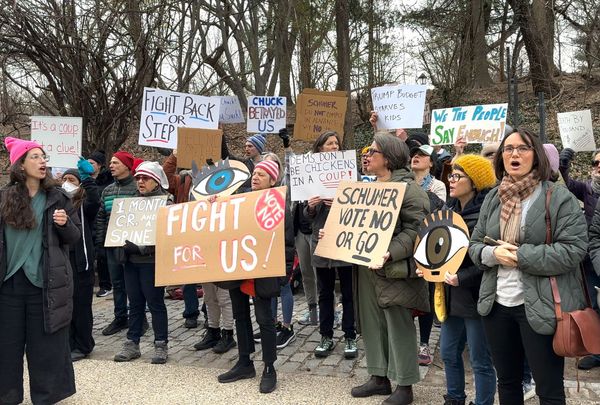
The people of France have delivered a political shock for the ages. As of Sunday at 8pm, the far right was not so much at the gates of power but with one foot halfway through them, having finished top in both the European elections and the first round of the snap legislative poll President Emmanuel Macron called in the immediate aftermath.
Projections from the first round result on June 30 had left Marine Le Pen’s National Rally within touching distance of an absolute majority of more than 289 seats in the French Parliament, which would have given the nation its first elected far-right prime minister in the form of 28-year-old Jordan Bardella. In the end, it came out with just 143, finishing third behind the left-wing New Popular Front alliance on 180 and the president’s bloc of centrists and the centre-right on 163.
With no party close to a majority in Parliament, the country’s future remains uncertain. But the far-right wolf has been chased from the door once again.
When the exit poll results were announced, left-wing gatherings around the country burst into rapturous relief. A week before Bastille Day, fireworks lit up the sky above the statue of Marianne, standing defiant in the centre of Paris, her republic saved once more by a coalition of erstwhile political foes banding together for the greater good.
Meanwhile, in the former royal hunting grounds, the Bois de Vincennes, a sulky Bardella grumbled to a subdued crowd of supporters about the “alliance of dishonour” that had kept the keys to the prime minister’s residence, the Hôtel de Matignon, out of his clammy grasp. A more defeat-hardened Marine Le Pen, twice the loser in the second round of presidential elections to Macron, equanimously declared victory was merely “deferred” rather than lost, her eyes already drifting towards the next battle for the Elysée Palace in 2027.
How did the National Rally manage to miss the mark, given that it had the polls, the momentum and a far-right friendly media on its side?
The major factor was the success of the republican front, a time-honoured tradition that saw candidates for the left-wing coalition and the centrist bloc drop out of races in which they came third and encouraged their voters to support their rivals to block the far right’s path to power. An unusually high turnout was also against it, showing, to the relief of millions in France and beyond, that voters are still more motivated to oppose the far right than they are to support its xenophobic worldview.
Much had been made of the National Rally’s supposedly charismatic prime ministerial candidate, but the truth is he was a weak proposition: Bardella has never had a job outside far-right politics, joining the party at 16 and working within it ever since. Missing out on the job of prime minister, he will have to settle for the presidency of a far-right supergroup in the European Parliament.
The National Rally’s platform was unclear — candidates prevaricated on whether they would repeal Macron’s detested retirement reforms, whether they would actually ban the hijab in public space or wait until later to do so, what exactly they meant by giving French people “national preference” for certain privileges, or which jobs they proposed to bar dual nationals from.
The party leadership protested they had not had enough time to vet their candidates, many of whom turned out to be either antisemitic, violent, homophobic, unacceptably racist even for a party founded on racism, or some demonic combination of all of the above. But they also had no satisfying response to why such people were so much more likely to put themselves forward for the National Rally than any of the other parties on offer.
And while Marine Le Pen had run on tackling the cost of living in the 2022 presidential election, her party was outflanked this time by a united left, which promised to lower the retirement age, raise the minimum wage and freeze the price of essentials while raising taxes on millionaires.
The other great loser from all this is the president himself. We should not be tempted to think that his “gamble” in dissolving Parliament — which might also be described as a tantrum — paid off. Thanks to the efforts of the republican front, his party’s showing in the second round looks less humiliating than it actually is. Still, Macron has lost 77 seats, his relative majority and the ability to easily appoint the next prime minister.
He has asked the current prime minister, Gabriel Attal, to stay on for the moment, after his former protégé offered his resignation as a formality on Monday morning. The trust appears broken between the two men, with Attal clearly distancing himself from Macron during the campaign and emphasising in his speech on Sunday that he “refused to suffer through” a dissolution he “did not choose”. Macron’s strategy of spending years ignoring the left and trying to neutralise the far right by aping its politics on immigration must now be over.
As for the left, the biggest question is whether it will be able to hold its coalition together. The France Unbowed leader Jean-Luc Mélenchon says the coalition has a mandate to enact its ambitious program, but that will not be a fait accompli without a majority. The New Popular Front was unable to produce a potential prime minister over four weeks of campaigning, cycling through various figures to debate Attal and Bardella, and the official line is that it will come up with one in the coming days.
Mélenchon remains a deeply divisive figure, yet his party has the most seats at 71, so his influence will weigh heavily on negotiations. An under-appreciated detail from the coalition’s victory is the revival in fortunes of the traditional Socialist Party, which has the second-largest share of seats in the coalition at 64 after being all but wiped out in 2022. Meanwhile, the break-out star of the campaign has been the perennially green blazer-clad environmentalist Marine Tondelier, an unflappable debater from the north with a history of taking on the far right in its heartland.
Let us not be deceived too long by the genuine relief felt at the prospect of an alternative to Macron’s ever more right-leaning, cynical approach to governing on one hand and the genuinely terrifying threat of a party founded by a member of the Waffen-SS gaining control of the world’s seventh-largest economy on the other.
With three major blocs in Parliament and no clear majority, political deadlock is the most likely scenario in the short-to-medium term in France. The centrist bloc has already begun to try to peel parts of the New Popular Front away from France Unbowed, but it would be political suicide for anyone on the left to strike a pact with Macron at this stage, and no-one but the most swivel-eyed conservatives will touch the National Rally.
Meanwhile, the far right may have missed out on Matignon, but it has increased its share of the national assembly from two seats in 2012 to 143 today and is on the ascent in Europe. The left has pulled off a staggering surprise victory and the Macronists have saved the furniture, but the challenge in politics remains to find a cause that a majority of French people will vote for, not just one they will unite against.
In calling these snap elections, Macron is said to have been pursuing a strategy of “me or chaos”. As the girl from the taco ad would say if she were French: pourquoi pas les deux?







